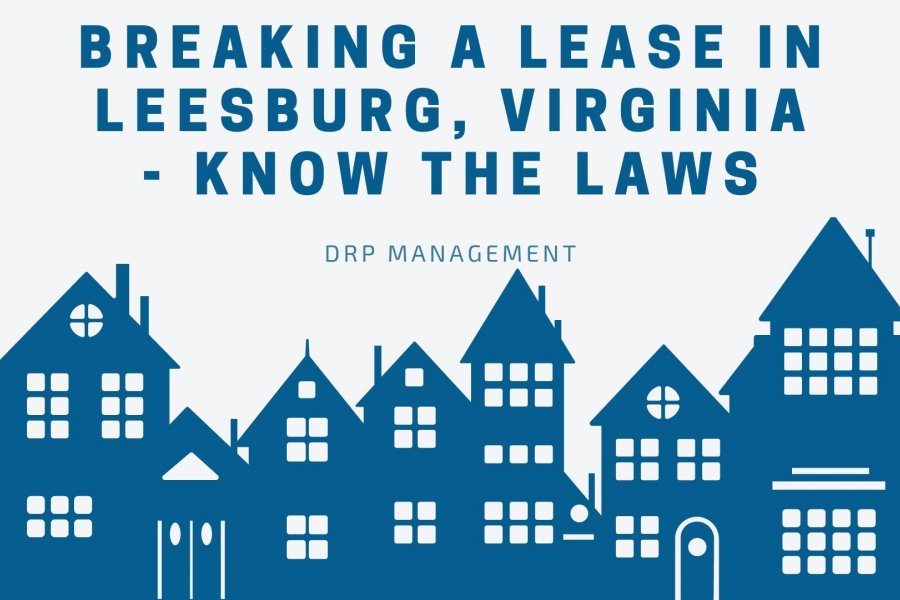
Breaking a property lease in Virginia is a serious violation of a contractual lease agreement. For this reason, landlords often penalize their Virginia tenants when they break a lease early.
When Can a Virginia Tenant Break Their Lease Agreement Without Penalty?
That said, there are certain situations in which tenants can legally break their lease or rental agreement early without penalty. The situations where a renter can break a lease agreement are as follows.
1. Early Termination Clause in the Lease
An early lease termination clause in the agreement gives tenants a leeway to break their lease early and legally without much penalty or deduction to their security deposit. All a tenant needs to do when they break a lease early is fulfil the early lease termination clause requirements. Which, in most cases, only require a tenant to pay a fee and provide ample notice prior to moving out and ending the lease.
2. Active Military Duty
A tenant who is relocating for active military service can also break their rental agreement or lease early legally in Virginia. This is made possible by the Servicemembers Civil Relief Act. The relief act protects “uniformed members” from the moment they start active duty to between thirty and ninety days after being discharged.
Per Virginia law, “uniformed members” include those serving in the armed forces and activated National Guard. Others are those serving as commissioned corps of the Public Health Service and the commissioned corps of the National Oceanic and Atmospheric Administration.
Before a tenant breaks a lease early in Virginia or a rental agreement, a tenant must:
• Provide the landlord with a written notice indicating their intent to move out
• Provide proof of their military assignment and active duty

Does the lease terminate automatically? No! The earliest a tenant can end a lease in Virginia is 30 days after the next rent period starts.
3. Habitability Issues
Virginia, just like the rest of the 49 states, has a habitability law in place. The habitability law specifies the specific safety and health standards that a rental property must meet. If the landlord fails to meet those standards in their rental properties, their renter may have various options to pursue including breaking their lease early.
According to VA Code § 55-225.3, a habitable rental property is one that:
• Complies with all applicable safety, health and structural codes
• Is clean and safe
• Is one with working heating, sanitary, plumbing, electrical, and air conditioning systems
• Has running hot and cold water
• Has properly maintained garbage receptacles
• Working smoke alarms
4. Privacy Violation
Virginia tenants have a right to enjoy their rented premises in peace and quiet. One example of a landlord violation to this right is barging into the property unannounced or without notice.
According to VA Code § 55-248.18(A), a Virginia landlord has a responsibility to provide their tenants with a written notice of at least 24 hours prior to entry.
In addition, a landlord must only enter the tenant’s rented premises only when the reason for entry is reasonable as part of their lease obligations. Such reasons include:
• To inspect it and make repairs
• To show it to prospective tenants or buyers
• Under court orders
• If the tenant has abandoned it
• In the event of an emergency

And it goes without saying that the landlord entry times must be within working business hours, or unless otherwise agreed between the landlord and tenant.
5. Landlord Harassment
If an action is serious enough to be considered harassment, a renter may obtain a legal right to break their lease obligations under the landlord-tenant law. Landlord harassment occurs when a landlord uses aggressive methods to intimidate their tenant to leave before their tenancy ends. Forceful eviction is illegal even when a tenant breaks a lease.
Examples of actions that would constitute landlord harassment include:
• Refusing a payment from your tenant when they are paying rent
• Exaggerating claims of lease violations in order to evict a tenant
• Removing windows and doors to the rental unit
• Shutting down previously available amenities
• Removing tenant’s belongings from the unit
• Failing to provide proper notice prior to entry
• Making sexual advances toward the tenant
• Threatening the tenant either verbally, physically, or electronically (like an email or text)
6. Lease Violation
A renter may also be able to break a lease if the landlord were to violate the terms of the lease agreement. A good example is if the landlord hikes-up the price of rent in a fixed-term lease. Another example would be if you, as the landlord, fail in material compliance affecting the tenant’s health and safety while they rent the unit.
7. Domestic Violence
The state of Virginia provides a victim of domestic violence with special rental provisions for their protection. Including, the right to break their lease if they are confronting a domestic violence issue.

Domestic conflict victims in Virginia includes stalking, sexual abuse, family abuse, and criminal sexual assault.
For the tenant to break the lease, VA Code § 55-225.16 requires that they serve the landlord with a 30 days’ advance notice. The landlord may also require the tenant to provide them with a copy of the conviction order or order of protection before breaking the lease.
8. Mandatory Disclosures
In Virginia, it is a landlord's duty to provide their tenants with certain information prior to the move in and lease signing. The following are some of the mandatory disclosures a rental property owner must make:
• A landlord must let their tenant know if the unit has a defective drywall
• The landlord must provide thier renter with a written notice if the unit is going to be demolished or significantly repaired within a 6-month period
• If you sell the property, you must provide your tenant with the contact information of the new landlord
• Landlords must let the tenant know if the rental is located near a noise zone or an accident potential zone
• Landlords must let your new tenant know if the unit has ever been used to manufacture meth
• If the rental was built prior to 1978, landlords must let their tenant know of any known lead paint hazards
Landlord’s Duty to Re-rent in the State of Virginia
According to Virginia state law, landlords have a responsibility to “mitigate damages” or re-rent to a replacement tenant after renters terminate their leases. This is according to VA Code § 55-248.33-35. So, rather than charge a tenant for all payments due under the lease, a landlord must make reasonable efforts to find a replacement tenant who can take over paying rent on a new lease.
If the landlord re-rents the space and is able to find a new tenant, the renter would only then become responsible to pay rent for the time the rental unit was vacant during their prior lease agreement.
Bottom Line
If you still have questions about breaking a lease in Virginia or any other part of landlord tenant laws, don’t worry! Our team here at DRP Property Management can guide you through every clause in the lease agreement. Get in touch with us today and find out how we can help ease your property management experience.
Disclaimer: This blog isn’t a substitute for professional legal advice. Laws change and this information may not be updated at the time you read it. For expert legal advice or help regarding any other aspect of property management or what to do when your tenant tries breaking their lease, DRP Management can help.
